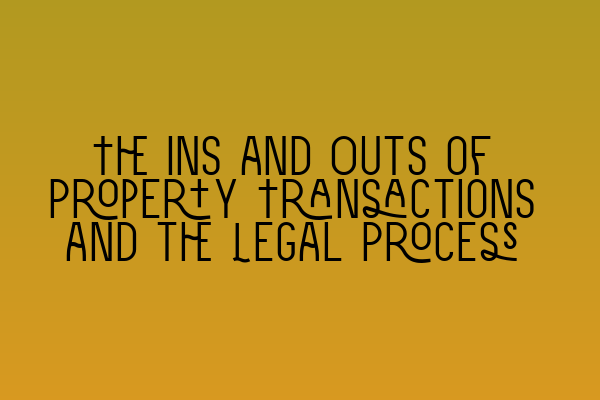The Ins and Outs of Property Transactions and the Legal Process
Property transactions can be complex and overwhelming, especially for individuals who are not familiar with the legal process. Whether you are buying or selling property, it is essential to understand the ins and outs of the legal procedures involved. In this article, we will explore the various steps and considerations involved in property transactions, providing you with a comprehensive guide to help navigate the legal process.
Step 1: Instruction of a Solicitor
The first step in any property transaction is to instruct a solicitor who specializes in property law. A solicitor will act as your legal representative throughout the process, ensuring that all legal obligations are met and protecting your interests. It is crucial to choose a solicitor with expertise in property law to ensure that you receive accurate and reliable advice.
Related Article: SQE 1 Practice Mocks FLK1 FLK2
Step 2: Property Searches and Due Diligence
Once you have instructed a solicitor, they will proceed with property searches and due diligence. This involves investigating the property’s legal status, planning restrictions, and any potential issues that may affect the transaction. Property searches typically include local authority searches, water and drainage searches, environmental searches, and chancel repair liability searches. Thorough due diligence is vital to identify any potential risks or problems associated with the property.
Related Article: SQE 1 Practice Exam Questions
Step 3: Drafting and Exchange of Contracts
Once all necessary searches and due diligence have been completed, your solicitor will draft the contract for the property transaction. The contract will outline the terms and conditions of the sale or purchase, including the agreed-upon price, deposit amount, and completion date. After both parties have reviewed and agreed upon the contract, it will be exchanged, legally binding both the buyer and seller to the transaction.
Related Article: SQE 2 Preparation Courses
Step 4: Completion and Transfer of Ownership
Completion is the final stage of the property transaction, and it involves the transfer of ownership from the seller to the buyer. On the completion day, the buyer’s solicitor will transfer the agreed-upon funds to the seller’s solicitor. Once the funds have been received, the seller’s solicitor will provide the buyer’s solicitor with the relevant legal documents, including the title deeds and keys to the property. At this point, the ownership of the property officially transfers to the buyer, and the transaction is complete.
Step 5: Registration and Post-Completion Matters
After completion, it is essential to register the property with the appropriate land registry. This ensures that the ownership details are recorded and legally recognized. Your solicitor will handle the registration process and submit the necessary documents to the land registry on your behalf. Additionally, post-completion matters may include notifying utility companies of the change in ownership and updating your information with relevant authorities.
Related Article: SQE 1 Preparation Courses
Conclusion
Property transactions involve a series of legal processes that require professional expertise and attention to detail. By following the steps outlined in this article and instructing a solicitor with experience in property law, you can navigate the legal process with confidence. Remember to conduct thorough due diligence, ensure the contract accurately reflects the terms of the transaction, and complete the necessary registrations and post-completion matters.
Related Article: SRA SQE Exam Dates
